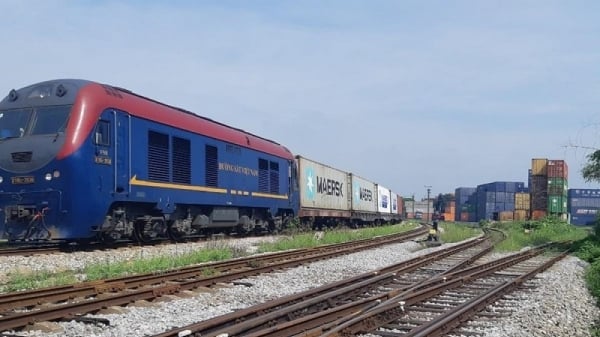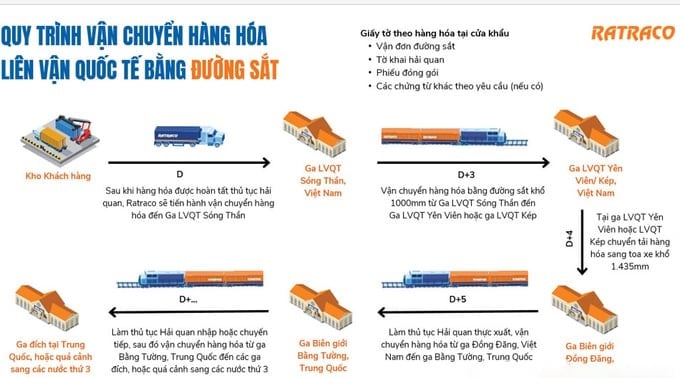November 26, 2025 | 13:47 GMT +7
November 26, 2025 | 13:47 GMT +7
Hotline: 0913.378.918
November 26, 2025 | 13:47 GMT +7
Hotline: 0913.378.918

Cao Xa station is expected to operate the first international multimodal train on April 23.
The above information was confirmed by Vietnam Railways (VNR) at the Conference on "Introducing Solutions for Transporting Import and Export Goods by International Multimodal Railway" on April 3.
Accordingly, Cao Xa station is being invested in by VNR to upgrade and renovate the 80-m2 office and customs service building; build toilets; build a 5,400-m2 goods yard (broken stone aggregate structure) with systems of lighting, water supply and drainage, surveillance cameras, and fire prevention and fighting; and improve the car road to the yard.
Phase 1, ending in April 2024, will renovate and upgrade the goods yard within the boundary of land managed by the railway and meet the minimum requirements for specialized bonded yards as prescribed. Construction started on January 26.
Phase 2, waiting for investment policy approval from the Ministry of Transport, will continue to expand the Cao Xa station’s goods yard to about 10,000 m2 and invest in the new construction of related construction items to be able to deploy customs procedures at the station for import and export goods, so that this place is qualified to become an international multimodal railway station.
Cao Xa Station is currently a class 4 station at Km 50+ 870 on the Hanoi - Hai Phong railway route. It is near major industrial parks in Hai Duong province, such as Dai An, Cam Dien, Phuc Dien, Tan Truong, Kenmark, etc.
Hai Duong currently has foreign trade relations with nearly 100 countries and territories. By turning Cao Xa station into an international multimodal station, businesses in the area will have more solutions to import and export goods to China, Europe, Central Asia, etc.
Some experts predict that with the new transportation method, transportation time on some important routes can be shortened by 2/3 compared to traditional sea routes. In addition, businesses located in Hai Duong can carry out procedures for declaring, importing, and exporting goods right in the province.

Process of international multimodal transportation of goods by rail.
VNR said that the total investment in phase 1 at Cao Xa station is about VND 60 billion. Phase 2 is expected to require an investment of more than VND 230 billion.
Before implementing the renovation and upgrading of Cao Xa station for phase 1, VNR sent a document to the Commission for Management of State Capital at Enterprises, Ministry of Transport. At the same time, the unit was approved to use the corporation's capital for investment.
VNR has calculated to build two operating routes for Cao Xa station after Cao Xa becomes an international multirmodal station. Specifically, route 1: Cao Xa international multimodal station (Hai Duong) - Yen Vien international multimodal station (Hanoi) - Kep international multimodal station (Bac Giang) - Dong Dang international multimodal station (Lang Son) - Pingxiang station (Guangxi, China). From here, go deep into China or transit China to Central Asian countries, Russia, and the EU.
Route 2: Cao Xa station (Hai Duong) - Lao Cai international multimodal station - Son Yeu station (Northern Hekou - Yunnan), from here change vehicles to go deeper into inland China.
VNR is urgently completing procedures to declare Cao Xa station as an international multimodal station and organize the first shipment expected on April 23 to celebrate the Liberation of the South and National Reunification Day on April 30, and International Workers' Day on May 1.
Translated by Huyen Vu Thu
/2025/11/26/3627-4-082628_818.jpg)
(VAN) From a small café on the red basalt highlands, Le Van Hoang started a business with clean coffee, building Enjoi Coffee into a symbol of organic agriculture in the Lam Dong plateau.
/2025/11/25/0045-1-135246_13.jpg)
(VAN) Ca Mau is researching a model of sea-encroaching embankments combined with viaducts and logistics service zones, aiming both to prevent erosion and create land funds for marine economic development.

(VAN) The information was shared at the seminar 'Urban Agriculture - Solutions for Developing Green Spaces,' organized by the Kinh te & Do thi Newspaper and the Biotechnology Center of Ho Chi Minh City.
/2025/11/19/4141-2-132831_216.jpg)
(VAN) One of Japfa's outstanding solutions is implementing digital transformation and artificial intelligence (AI) to optimize operations, enhance productivity, and advance sustainable development.
/2025/11/19/4847-1-093540_448.jpg)
(VAN) The Gia Lai Provincial People’s Committee had a working session with the delegation of the U.S. Department of Agriculture, the State of Idaho, and representatives of the State's leading enterprises.

(VAN) Ca Mau has a sufficient foundation to become a strong regional aquaculture center, where production integrates the economy, the environment, and the lives of the people.

(VAN) SEIKI Group envisions itself as a pioneer in the ‘dual transformation’ of digital technology and green industry, standing alongside the Government and Vietnamese businesses in their pursuit of sustainable development.